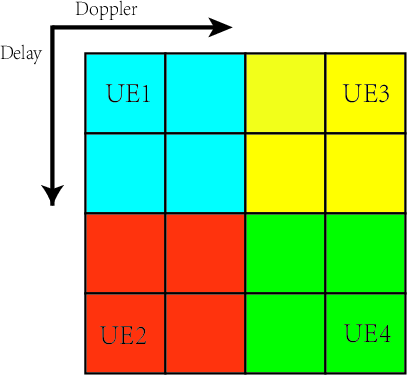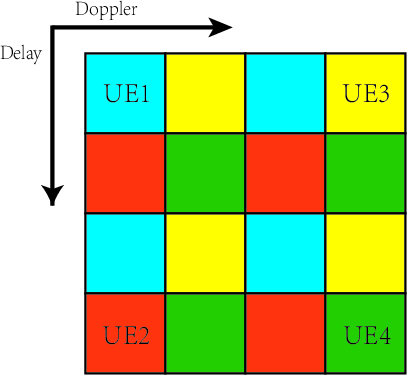OTFS vs OFDM: Which is Superior in Multiuser LEO Satellite Communications (2403.02012v1)
Abstract: Orthogonal time frequency space (OTFS) modulation, a delay-Doppler (DD) domain communication scheme exhibiting strong robustness against the Doppler shifts, has the potentials to be employed in LEO satellite communications. However, the performance comparison with the orthogonal frequency division multiplexing (OFDM) modulation and the resource allocation scheme for multiuser OTFS-based LEO satellite communication system have rarely been investigated. In this paper, we conduct a performance comparison under various channel conditions between the OTFS and OFDM modulations, encompassing evaluations of sum-rate and bit error ratio (BER). Additionally, we investigate the joint optimal allocation of power and delay-Doppler resource blocks aiming at maximizing sum-rate for multiuser downlink OTFS-based LEO satellite communication systems. Unlike the conventional modulations relaying on complex input-output relations within the Time-Frequency (TF) domain, the OTFS modulation exploits both time and frequency diversities, i.e., delay and Doppler shifts remain constant during a OTFS frame, which facilitates a DD domain input-output simple relation for our investigation. We transform the resulting non-convex and combinatorial optimization problem into an equivalent difference of convex problem by decoupling the conditional constraints, and solve the transformed problem via penalty convex-concave procedure algorithm. Simulation results demonstrate that the OTFS modulation is robust to carrier frequency offsets (CFO) caused by high-mobility of LEO satellites, and has superior performance to the OFDM modulation. Moreover, numerical results indicate that our proposed resource allocation scheme has higher sum-rate than existed schemes for the OTFS modulation, such as delay divided multiple access and Doppler divided multiple access, especially in the high signal-to-noise ratio (SNR) regime.
- C. D. Alwis, A. Kalla, Q.-V. Pham, P. Kumar, K. Dev, W.-J. Hwang, and M. Liyanage, “Survey on 6g frontiers: Trends, applications, requirements, technologies and future research,” IEEE Open Journal of the Communications Society, vol. 2, pp. 836–886, 2021.
- H. Tataria, M. Shafi, A. F. Molisch, M. Dohler, H. Sjöland, and F. Tufvesson, “6g wireless systems: Vision, requirements, challenges, insights, and opportunities,” Proceedings of the IEEE, vol. 109, no. 7, pp. 1166–1199, 2021.
- E. Yaacoub and M.-S. Alouini, “A key 6g challenge and opportunity—connecting the base of the pyramid: A survey on rural connectivity,” Proceedings of the IEEE, vol. 108, no. 4, pp. 533–582, 2020.
- A. Guidotti, A. Vanelli-Coralli, M. Conti, S. Andrenacci, S. Chatzinotas, N. Maturo, B. Evans, A. Awoseyila, A. Ugolini, T. Foggi, L. Gaudio, N. Alagha, and S. Cioni, “Architectures and key technical challenges for 5g systems incorporating satellites,” IEEE Transactions on Vehicular Technology, vol. 68, no. 3, pp. 2624–2639, 2019.
- Z. Xiao, L. Zhu, Y. Liu, P. Yi, R. Zhang, X.-G. Xia, and R. Schober, “A survey on millimeter-wave beamforming enabled uav communications and networking,” IEEE Communications Surveys & Tutorials, vol. 24, no. 1, pp. 557–610, 2022.
- D. Zhou, M. Sheng, J. Li, and Z. Han, “Aerospace integrated networks innovation for empowering 6g: A survey and future challenges,” IEEE Communications Surveys & Tutorials, vol. 25, no. 2, pp. 975–1019, 2023.
- B. Di, L. Song, Y. Li, and H. V. Poor, “Ultra-dense leo: Integration of satellite access networks into 5g and beyond,” IEEE Wireless Communications, vol. 26, no. 2, pp. 62–69, 2019.
- J. Liu, Y. Shi, Z. M. Fadlullah, and N. Kato, “Space-air-ground integrated network: A survey,” IEEE Communications Surveys & Tutorials, vol. 20, no. 4, pp. 2714–2741, 2018.
- H. Yao, L. Wang, X. Wang, Z. Lu, and Y. Liu, “The space-terrestrial integrated network: An overview,” IEEE Communications Magazine, vol. 56, no. 9, pp. 178–185, 2018.
- J. Foust, “Spacex’s space-internet woes: Despite technical glitches, the company plans to launch the first of nearly 12,000 satellites in 2019,” IEEE Spectrum, vol. 56, no. 1, pp. 50–51, 2019.
- O. B. Osoro and E. J. Oughton, “A techno-economic framework for satellite networks applied to low earth orbit constellations: Assessing starlink, oneweb and kuiper,” IEEE Access, vol. 9, pp. 141 611–141 625, 2021.
- 3rd Generation Partnership Project (3GPP), “3GPP TR 38.811: Study on New Radio (NR) to support non-terrestrial networks,” 3GPP, Technical Report TR 38.811, 2020.
- H. Zhu and J. Wang, “Chunk-based resource allocation in ofdma systems - part i: chunk allocation,” IEEE Transactions on Communications, vol. 57, no. 9, pp. 2734–2744, 2009.
- ——, “Chunk-based resource allocation in ofdma systems—part ii: Joint chunk, power and bit allocation,” IEEE Transactions on Communications, vol. 60, no. 2, pp. 499–509, 2012.
- Z. Wei, W. Yuan, S. Li, J. Yuan, G. Bharatula, R. Hadani, and L. Hanzo, “Orthogonal time-frequency space modulation: A promising next-generation waveform,” IEEE Wireless Communications, vol. 28, no. 4, pp. 136–144, 2021.
- S. Li, W. Yuan, Z. Wei, R. He, B. Ai, B. Bai, and J. Yuan, “A tutorial to orthogonal time frequency space modulation for future wireless communications,” in 2021 IEEE/CIC International Conference on Communications in China (ICCC Workshops), 2021, pp. 439–443.
- R. Hadani, S. Rakib, M. Tsatsanis, A. Monk, A. J. Goldsmith, A. F. Molisch, and R. Calderbank, “Orthogonal time frequency space modulation,” in 2017 IEEE Wireless Communications and Networking Conference (WCNC), 2017, pp. 1–6.
- A. Farhang, A. RezazadehReyhani, L. E. Doyle, and B. Farhang-Boroujeny, “Low complexity modem structure for ofdm-based orthogonal time frequency space modulation,” IEEE Wireless Communications Letters, vol. 7, no. 3, pp. 344–347, 2018.
- P. Raviteja, K. T. Phan, Q. Jin, Y. Hong, and E. Viterbo, “Low-complexity iterative detection for orthogonal time frequency space modulation,” in 2018 IEEE Wireless Communications and Networking Conference (WCNC), 2018, pp. 1–6.
- P. Raviteja, K. T. Phan, Y. Hong, and E. Viterbo, “Interference cancellation and iterative detection for orthogonal time frequency space modulation,” IEEE Transactions on Wireless Communications, vol. 17, no. 10, pp. 6501–6515, 2018.
- P. Raviteja, Y. Hong, E. Viterbo, and E. Biglieri, “Practical pulse-shaping waveforms for reduced-cyclic-prefix otfs,” IEEE Transactions on Vehicular Technology, vol. 68, no. 1, pp. 957–961, 2019.
- A. RezazadehReyhani, A. Farhang, M. Ji, R. R. Chen, and B. Farhang-Boroujeny, “Analysis of discrete-time mimo ofdm-based orthogonal time frequency space modulation,” in 2018 IEEE International Conference on Communications (ICC), 2018, pp. 1–6.
- S. K. Mohammed, “Derivation of otfs modulation from first principles,” IEEE Transactions on Vehicular Technology, vol. 70, no. 8, pp. 7619–7636, 2021.
- F. Lampel, A. Avarado, and F. M. Willems, “On otfs using the discrete zak transform,” in 2022 IEEE International Conference on Communications Workshops (ICC Workshops), 2022, pp. 729–734.
- H. Bolcskei and F. Hlawatsch, “Discrete zak transforms, polyphase transforms, and applications,” IEEE Transactions on Signal Processing, vol. 45, no. 4, pp. 851–866, 1997.
- G. D. Surabhi, R. M. Augustine, and A. Chockalingam, “On the diversity of uncoded otfs modulation in doubly-dispersive channels,” IEEE Transactions on Wireless Communications, vol. 18, no. 6, pp. 3049–3063, 2019.
- P. Raviteja, Y. Hong, E. Viterbo, and E. Biglieri, “Effective diversity of otfs modulation,” IEEE Wireless Communications Letters, vol. 9, no. 2, pp. 249–253, 2020.
- S. Li, J. Yuan, W. Yuan, Z. Wei, B. Bai, and D. W. K. Ng, “Performance analysis of coded otfs systems over high-mobility channels,” IEEE Transactions on Wireless Communications, vol. 20, no. 9, pp. 6033–6048, 2021.
- P. Raviteja, K. T. Phan, and Y. Hong, “Embedded pilot-aided channel estimation for otfs in delay–doppler channels,” IEEE Transactions on Vehicular Technology, vol. 68, no. 5, pp. 4906–4917, 2019.
- D. Shi, W. Wang, L. You, X. Song, Y. Hong, X. Gao, and G. Fettweis, “Deterministic pilot design and channel estimation for downlink massive mimo-otfs systems in presence of the fractional doppler,” IEEE Transactions on Wireless Communications, vol. 20, no. 11, pp. 7151–7165, 2021.
- W. Yuan, S. Li, Z. Wei, J. Yuan, and D. W. K. Ng, “Data-aided channel estimation for otfs systems with a superimposed pilot and data transmission scheme,” IEEE Wireless Communications Letters, vol. 10, no. 9, pp. 1954–1958, 2021.
- Z. Wei, W. Yuan, S. Li, J. Yuan, and D. W. K. Ng, “Off-grid channel estimation with sparse bayesian learning for otfs systems,” IEEE Transactions on Wireless Communications, vol. 21, no. 9, pp. 7407–7426, 2022.
- S. Li, W. Yuan, Z. Wei, J. Yuan, B. Bai, D. W. K. Ng, and Y. Xie, “Hybrid map and pic detection for otfs modulation,” IEEE Transactions on Vehicular Technology, vol. 70, no. 7, pp. 7193–7198, 2021.
- Z. Yuan, F. Liu, W. Yuan, Q. Guo, Z. Wang, and J. Yuan, “Iterative detection for orthogonal time frequency space modulation with unitary approximate message passing,” IEEE Transactions on Wireless Communications, vol. 21, no. 2, pp. 714–725, 2022.
- T. Thaj and E. Viterbo, “Low complexity iterative rake decision feedback equalizer for zero-padded otfs systems,” IEEE Transactions on Vehicular Technology, vol. 69, no. 12, pp. 15 606–15 622, 2020.
- G. D. Surabhi and A. Chockalingam, “Low-complexity linear equalization for otfs modulation,” IEEE Communications Letters, vol. 24, no. 2, pp. 330–334, 2020.
- X. Zhou, K. Ying, Z. Gao, Y. Wu, Z. Xiao, S. Chatzinotas, J. Yuan, and B. Ottersten, “Active terminal identification, channel estimation, and signal detection for grant-free noma-otfs in leo satellite internet-of-things,” IEEE Transactions on Wireless Communications, vol. 22, no. 4, pp. 2847–2866, 2023.
- A. S. Bora, K. T. Phan, and Y. Hong, “Spatially correlated mimo-otfs for leo satellite communication systems,” in 2022 IEEE International Conference on Communications Workshops (ICC Workshops), 2022, pp. 723–728.
- S. Buzzi, G. Caire, G. Colavolpe, C. D’Andrea, T. Foggi, A. Piemontese, and A. Ugolini, “Leo satellite diversity in 6g non-terrestrial networks: Ofdm vs. otfs,” IEEE Communications Letters, vol. 27, no. 11, pp. 3013–3017, 2023.
- V. Khammammetti and S. K. Mohammed, “Otfs-based multiple-access in high doppler and delay spread wireless channels,” IEEE Wireless Communications Letters, vol. 8, no. 2, pp. 528–531, 2019.
- X. Lin, S. Huang, Y. Zhao, Z. Tie, J. Shi, W. Liang, and Z. Li, “Resource allocation for noma based otfs transmission with heterogeneous mobility users,” in 2022 IEEE 10th International Conference on Information, Communication and Networks (ICICN), 2022, pp. 91–98.
- S. Li, W. Yuan, Z. Wei, and J. Yuan, “Cross domain iterative detection for orthogonal time frequency space modulation,” IEEE Transactions on Wireless Communications, vol. 21, no. 4, pp. 2227–2242, 2022.
- Z. Wei, W. Yuan, S. Li, J. Yuan, and D. W. K. Ng, “Transmitter and receiver window designs for orthogonal time-frequency space modulation,” IEEE Transactions on Communications, vol. 69, no. 4, pp. 2207–2223, 2021.
- R. Hadani, S. Rakib, S. Kons, M. Tsatsanis, A. Monk, C. Ibars, J. Delfeld, Y. Hebron, A. J. Goldsmith, A. F. Molisch, and R. Calderbank, “Orthogonal time frequency space modulation,” 2018.
- M. Li, S. Zhang, F. Gao, P. Fan, and O. A. Dobre, “A new path division multiple access for the massive mimo-otfs networks,” IEEE Journal on Selected Areas in Communications, vol. 39, no. 4, pp. 903–918, 2021.
- T. Lipp and S. Boyd, “Variations and extension of the convex–concave procedure,” Optimization and Engineering, vol. 17, pp. 263–287, 2016.
- H. A. L. Thi, V. N. Huynh, and T. P. Dinh, “Dc programming and dca for general dc programs,” in International Conference on Computer Science, Applied Mathematics and Applications, 2014.
Sponsor
Paper Prompts
Sign up for free to create and run prompts on this paper using GPT-5.
Top Community Prompts
Collections
Sign up for free to add this paper to one or more collections.




